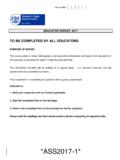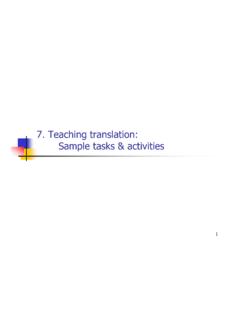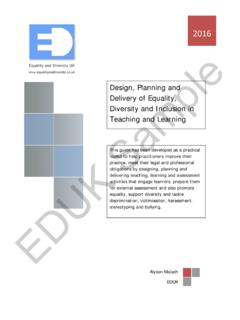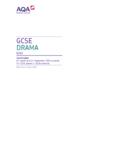Transcription of FEEDBACK TO THE TEACHER / HoD / SCHOOL / …
1 FEEDBACK TO THE TEACHER / HoD / SCHOOL / district / HEAD OFFICE 1. PEOPLE DEVELOPMENT EMERGING EFFECTIVE DISTINGUISHED a. TEACHER professional development To what extent is TEACHER /official professional development needs identified and recorded to capacitate them accordingly in the content and pedagogical requirements of the subject so that learning can be maximised also through effective curriculum interpretation? Capacity for identifying and securing further professional development is poor and the improvements SCHOOL leaders made are unsustainable, have been implemented too slowly or are overly dependent on external support. SCHOOL leaders are not doing enough to tackle poor teaching, learning and assessment, which significantly impairs the progress of learners, especially those who are disadvantaged, disabled or have special educational needs.
2 Little is done to expose teachers to professional development opportunities that will enhance their practice. SCHOOL leaders use performance management effectively to improve teaching. They use accurate monitoring to identify professional needs and spread good practice across the SCHOOL . Teachers value the range of continuing professional development provided by the SCHOOL . It is having a positive impact on their teaching and learners learning. Teaching is consistently strong across the SCHOOL or, where it is not, it is improving rapidly due to subject head and SA support. While teachers are identified and sent for training at CTLI for example, no follow up support is given at SCHOOL level and no sharing of new insights/skills to the rest of the staff.
3 SCHOOL leaders use incisive performance management that leads to professional development that encourages, challenges and supports teachers improvement. Staff reflect on and debate the way they teach. They feel deeply involved in their own professional development. Seniors have created a climate in which teachers are motivated and trusted to take risks and innovate in ways that are right for their learners. A dedicated system, headed by the principal, subject head and SA is in place to support TEACHER to implement professional development training. Regular staff development sessions at SCHOOL provide opportunity to share new insights/skills. b. professional learning communities To what extent is the participation in PLC s promoted and used to bring together significant role players to share pedagogical content knowledge, best practice, mediate teaching challenges and encourage members to use available professional development opportunities to strengthen teaching practice inside the SCHOOL and with others?
4 There is little or no evidence that SAs/ SCHOOL encourage teachers in joining PLCs to keep up with professional knowledge and best practice Few staff members believe the SCHOOL provides opportunities for effective professional learning Little or no evidence that SCHOOL leaders encourage teachers to draw on ideas and research about better ways to teach and discuss it with staff members or other related TEACHER /subject groupings There is clear, convincing evidence that the SCHOOL is focussing on improving professional knowledge and practice through the participation in PLCs The SCHOOL implements a policy encouraging participation in PLCs to keep up with professional knowledge and best practice SCHOOL leaders encourage teachers to draw on ideas and research about better ways to teach, and create opportunities to discus and evaluate them at SCHOOL and in PLC contexts Most teachers believe that if they improve the quality of their teaching, it will be recognised appropriately SCHOOL /staff operate as a learning community that is committed to research informed and evidence-based practice, collaborative FEEDBACK , and building the capacity of all through reflection and analysis.
5 Members of various PLCs continue to experiment with new ideas and report to colleagues on what they have learnt. The SCHOOL has a professional learning programme that focuses on deepening teachers knowledge of content that learners are to learn and how to address the different problems they have in learning that content; analysis of differences between actual learner performance and the targets set in SIP. Teachers know that deep professional learning depends on taking risks. SCHOOL leaders lead discussions about the relative merits of current and alternative practice. c. Recruitment, induction and retention To what extent do schools/districts/HO ensure the appointment and retention of highly competent specialist teachers/officials by using targeted recruitment, effective induction and mentoring, and incentives to enhance teaching and learning?
6 D. Learner self-esteem, direction and self-regulation To what extent is a positive learner self-esteem promoted through clear guidance, explicit criteria, linking new knowledge to other knowledges, and encouragement to take ownership of learning and to work hard? Learners lack of engagement, persistent low-level and/or high-level wilful disruption contribute to reduced learning and/or disorderly classrooms. Learners or particular groups are making inadequate progress because the teaching does not develop their knowledge, understanding and skills sufficiently. Learners show negative attitudes about the value of good manners and behaviour as key factors in SCHOOL life, adult life and work. Attendance is consistently low for all learners or groups of learners and shows little sign of sustained improvement.
7 Learners are confident and self-assured. They take pride in their work, their SCHOOL and their appearance. Learners develop the capacity to learn from mistakes and they become keen learners who want to find out more. Most are willing to find out new information to develop, consolidate and deepen their knowledge, understanding and skills, both in lessons and in extra-curricular activities. Most learners commit to improving their work. They are given time to apply their knowledge and understanding in new ways that stretches their thinking in a wide range of subjects, and to practise key skills. Teachers set homework, in line with the SCHOOL s policy and as appropriate for the age and phase of learners, that consolidates learning and prepares learners well for work to come.
8 Learners value their education. Few are absent or persistently absent. No groups of learners are disadvantaged by low attendance. The attendance of learners who have previously had exceptionally high rates of absence is showing marked and sustained improvement. Learners are confident, self-assured learners. Their excellent attitudes to learning have a strong, positive impact on their progress. They are proud of their achievements and of their SCHOOL . Learners love the challenge of learning and are resilient to failure. They are curious, interested learners who seek out and use new information to develop, consolidate and deepen their knowledge, understanding and skills. They thrive in lessons and also regularly take up opportunities to learn through extra-curricular activities.
9 Learners are eager to know how to improve their learning. They capitalise on opportunities to use FEEDBACK , written or oral, to improve. Teachers set challenging homework, in line with the SCHOOL s policy and as appropriate for the age and phase of learners, that consolidates learning, deepens understanding and prepares learners very well for work to come. Learners understand how their education equips them with the behaviours and attitudes necessary for success in their next stage of education, training or employment and for their adult life. Learners value their education and rarely miss a day at SCHOOL . No groups of learners are disadvantaged by low attendance. e. Parental involvement To what extent are parents/guardians encouraged to become involved in supporting their child to learn the subject effectively, understanding the subject strategy and targets, how their support may influence their child s achievement and how their child s progress is communicated to ensure continued involvement?
10 Strategies for engaging parents/guardians about their child s learning and development are weak. Consequently, parents/guardians do not know the reason for the strategy, what their child is learning or how they can help them improve. Parents/guardians contribute to initial assessments of children s starting points and are kept well informed about their children s progress. Parents/guardians are encouraged to support their children s learning and development at home. The SCHOOL gives parents accurate information about how well their child is progressing, how well their child is doing in relation to the learning objectives expected, and what their child needs to do to improve and how parents/guardians can support. SCHOOL leaders use highly successful strategies to engage parents/guardians, including specialist from different groups, in their children s learning in SCHOOL and at home.








